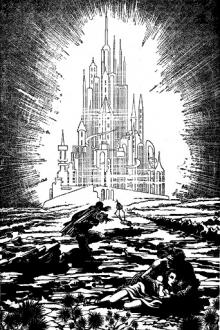Short Fiction - Philip K. Dick (100 books to read in a lifetime TXT) 📗

- Author: Philip K. Dick
Book online «Short Fiction - Philip K. Dick (100 books to read in a lifetime TXT) 📗». Author Philip K. Dick
“Hello, Phil,” Dolores said. “Well, aren’t you glad to see me?”
He nodded. “How have you been? You’re looking fine.” She was still pretty and slender in her uniform, the blue-grey of Internal Security, Gross’ organization.
“Thanks.” She smiled. “You seem to be doing all right, too. Commander Gross tells me that you’re responsible for this project, Operation Head, as they call it. Whose head have you decided on?”
“That’s the problem.” Kramer lit a cigarette. “This ship is to be equipped with a human brain instead of the Johnson system. We’ve constructed special draining baths for the brain, electronic relays to catch the impulses and magnify them, a continual feeding duct that supplies the living cells with everything they need. But—”
“But we still haven’t got the brain itself,” Gross finished. They began to walk back toward the car. “If we can get that we’ll be ready for the tests.”
“Will the brain remain alive?” Dolores asked. “Is it actually going to live as part of the ship?”
“It will be alive, but not conscious. Very little life is actually conscious. Animals, trees, insects are quick in their responses, but they aren’t conscious. In this process of ours the individual personality, the ego, will cease. We only need the response ability, nothing more.”
Dolores shuddered. “How terrible!”
“In time of war everything must be tried,” Kramer said absently. “If one life sacrificed will end the war it’s worth it. This ship might get through. A couple more like it and there wouldn’t be any more war.”
They got into the car. As they drove down the road, Gross said, “Have you thought of anyone yet?”
Kramer shook his head. “That’s out of my line.”
“What do you mean?”
“I’m an engineer. It’s not in my department.”
“But all this was your idea.”
“My work ends there.”
Gross was staring at him oddly. Kramer shifted uneasily.
“Then who is supposed to do it?” Gross said. “I can have my organization prepare examinations of various kinds, to determine fitness, that kind of thing—”
“Listen, Phil,” Dolores said suddenly.
“What?”
She turned toward him. “I have an idea. Do you remember that professor we had in college. Michael Thomas?”
Kramer nodded.
“I wonder if he’s still alive.” Dolores frowned. “If he is he must be awfully old.”
“Why, Dolores?” Gross asked.
“Perhaps an old person who didn’t have much time left, but whose mind was still clear and sharp—”
“Professor Thomas.” Kramer rubbed his jaw. “He certainly was a wise old duck. But could he still be alive? He must have been seventy, then.”
“We could find that out,” Gross said. “I could make a routine check.”
“What do you think?” Dolores said. “If any human mind could outwit those creatures—”
“I don’t like the idea,” Kramer said. In his mind an image had appeared, the image of an old man sitting behind a desk, his bright gentle eyes moving about the classroom. The old man leaning forward, a thin hand raised—
“Keep him out of this,” Kramer said.
“What’s wrong?” Gross looked at him curiously.
“It’s because I suggested it,” Dolores said.
“No.” Kramer shook his head. “It’s not that. I didn’t expect anything like this, somebody I knew, a man I studied under. I remember him very clearly. He was a very distinct personality.”
“Good,” Gross said. “He sounds fine.”
“We can’t do it. We’re asking his death!”
“This is war,” Gross said, “and war doesn’t wait on the needs of the individual. You said that yourself. Surely he’ll volunteer; we can keep it on that basis.”
“He may already be dead,” Dolores murmured.
“We’ll find that out,” Gross said speeding up the car. They drove the rest of the way in silence.
For a long time the two of them stood studying the small wood house, overgrown with ivy, set back on the lot behind an enormous oak. The little town was silent and sleepy; once in a while a car moved slowly along the distant highway, but that was all.
“This is the place,” Gross said to Kramer. He folded his arms. “Quite a quaint little house.”
Kramer said nothing. The two Security Agents behind them were expressionless.
Gross started toward the gate. “Let’s go. According to the check he’s still alive, but very sick. His mind is agile, however. That seems to be certain. It’s said he doesn’t leave the house. A woman takes care of his needs. He’s very frail.”
They went down the stone walk and up onto the porch. Gross rang the bell. They waited. After a time they heard slow footsteps. The door opened. An elderly woman in a shapeless wrapper studied them impassively.
“Security,” Gross said, showing his card. “We wish to see Professor Thomas.”
“Why?”
“Government business.” He glanced at Kramer.
Kramer stepped forward. “I was a pupil of the Professor’s,” he said. “I’m sure he won’t mind seeing us.”
The woman hesitated uncertainly. Gross stepped into the doorway. “All right, mother. This is war time. We can’t stand out here.”
The two Security agents followed him, and Kramer came reluctantly behind, closing the door. Gross stalked down the hall until he came to an open door. He stopped, looking in. Kramer could see the white corner of a bed, a wooden post and the edge of a dresser.
He joined Gross.
In the dark room a withered old man lay, propped up on endless pillows. At first it seemed as if he were asleep; there was no motion or sign of life. But after a time Kramer saw with a faint shock that the old man was watching them intently, his eyes fixed on them, unmoving, unwinking.
“Professor Thomas?” Gross said. “I’m Commander Gross of Security. This man with me is perhaps known to you—”
The faded eyes fixed on Kramer.
“I know him. Philip Kramer. … You’ve grown heavier, boy.” The voice was feeble, the rustle of dry ashes. “Is it true you’re married now?”
“Yes. I married Dolores French. You remember her.” Kramer came toward the bed. “But we’re separated. It didn’t work out very well. Our careers—”
“What we came here about, Professor,” Gross began, but Kramer cut him off with an impatient wave.
“Let me talk. Can’t you and your men get out of here





Comments (0)